Research Events and Conferences Body Text
Past Events and Conferences
2014/2015 Academic Year
Greenberg Research Fellow Jared McBride Identifies Holocaust Victims and Perpetrators Through Testimony
February 6, 2015
For Jared McBride, the 2014-2015 Margee and Douglas Greenberg Fellow, using multimedia techniques in his research not only helps him form more detailed historical narratives of what happened on the ground during the Holocaust, it also helps him reach more people today about the importance of understanding this major historical event.
In January, McBride gave a talk to students, staff and faculty at USC titled "Constructing a Micro-history of the Holocaust in Western Ukraine." In his lecture, he addressed the success and difficulty of working with archival sources, as well as testimonies from USC Shoah Foundation's Visual History Archive.
He said that in many cases, testimony from the Visual History Archive helps confirm information that is otherwise difficult to access in many of the former Soviet territories. During German occupation of the Volhynia region in Western Ukraine, much of the pogrom activities and initial killings were conducted on the ground by local police forces. This is an observation he was able to make based on information gained through testimony.
Focusing his research on the perpetrators of this violence, McBride's study looked at the involvement of the Ukrainian police in the border Volhynia region and their actions toward victims who were in many cases acquaintances or even neighbors. Choosing a micro-historical approach to the region, McBride sought to identify specific perpetrators and link them to their victims.
Through archival material, he has been able to collect a biographical database of Ukrainian perpetrators in Volhynia; the Visual History Archive allowed him to obtain testimony confirming the involvement of these specific perpetrators, who are often named by their victims.
Using this in-depth research, McBride has met with survivors who gave testimony to the Visual History Archive and helped them to find closure about the nature of their attackers. McBride's lecture was indicative of the ways that scholars are now using multimedia research techniques to form more detailed historical narratives. His presentation allows for the opening of much broader historical debate about the implementation these new methods and the future of field. For more information on Jared McBride and his research view here
Memory, Media, and Technology: Exploring the Trajectories of Schindler's List
2014 International Conference
The release of Schindler’s List in 1994 and the subsequent founding of the Survivors of the Shoah Visual History Foundation took place amid an extraordinary flourishing of public memorial projects and scholarship on memory. At the same time, innovations in digital media technologies began to transform how people communicate, publish, research—and even how they remember the past. Since then, public work on memory—ranging from museums and monuments to truth commissions and survivor documentation—has proliferated, as have ideas about its value for the future. This conference marked the 20th anniversary of Schindler’s List and USC Shoah Foundation (the current name and affiliation of the Shoah Visual History Foundation) by examining the trajectories of memory, media, and technology in multiple forms and venues and from the vantage of a range of disciplines. Presentations by scholars and educators on their work were complemented by roundtable discussions on the role of media archives in research and education, the role of mediated memories in facilitating public action, and the future of these new practices for mediating memory.
Visit the International Conference Homepage for more information by clicking here: http://sfi.usc.edu/research/conferences/2014_international.
2013/2014 Academic Year
The Holocaust and Ethnic Cleansing in the North Caucasus, 1942-43
Lecture with Crispin Brooks, Curator of the Visual History Archive
November 12, 2013
Crispin Brooks presented a paper that examines the parallels of Nazi and Soviet Mass Violence in the Karachai autonomous region, 1942-43. In one small part of the North Caucasus region of southern Russia, two major instances of organized mass violence were perpetrated by two different states within the space of almost a year. The paper draws on contemporary documents as well as video testimony to examine the contexts, parallels, and differences between the Nazi massacres of Jews in the Karachai Autonomous Region (August 1942 – January 1943) and the November 1943 Soviet ethnic cleansing of the region’s Karachai people.
______________________________________________________________________________________________________________
An Evening with Professors Yehuda Bauer and Xu Xin
November 7, 2013
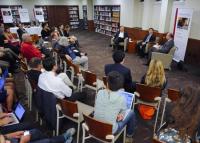 How does location impact the way teaching the Holocaust is approached? Join the USC Shoah Foundation as it brings together Professors Yehuda Bauer and Xu Xin for the first time in a discussion of the differences of teaching Jewish Studies and the Holocaust in Israel and China. Each will explore the challenges they face in dealing with the Holocaust and comparative genocide in their cultural, linguistic, and historical context.
How does location impact the way teaching the Holocaust is approached? Join the USC Shoah Foundation as it brings together Professors Yehuda Bauer and Xu Xin for the first time in a discussion of the differences of teaching Jewish Studies and the Holocaust in Israel and China. Each will explore the challenges they face in dealing with the Holocaust and comparative genocide in their cultural, linguistic, and historical context.
______________________________________________________________________________________________________________
2012/2013 Academic Year
The Nanjing Massacre by Wing Tek Lum
Poetry Reading
April 30, 2013
Poet Wing Tek Lum read from his book, The Nanjing Massacre. Wing Tek Lumʼs poems capture all perspectives of this 1937 tragedy—from the weary, casually cruel Japanese soldiers to the uncomprehending child victims, and from the desperate, helpless parents and the brutalized “comfort women” to the bloodless yet vicious bureaucrats of death. Drawing on published histories, memoirs, photographic collections, and oral histories, Lum composes testimony after testimony for the silenced—poetic memorials that also provide “some measure of revenge” against the victors. At key moments, he also broadens the frame of reference, linking the crimes in China to the atrocities committed since then at different times, on different continents. Massacres, he suggests, bear a family resemblance—the human family. But The Nanjing Massacre is much more than a chamber of horrors. Lumʼs spare and meticulous verse offers up vivid, memorable, and even beautiful images, and many of the poems are mini-narratives, suspenseful and compelling. The result is a gallery of disturbing portraits that nevertheless move us through their artistry and truth.
______________________________________________________________________________________________________________
Small Acts of Repair
Lecture with 2013 Yom HaShoah Scholar-in-Residence, Marianne Hirsch
April 25, 2013
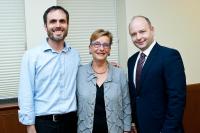 Marianne Hirsch discussed “postmemory,” a term that describes the relationship that the generation after has with the personal, collective, and cultural trauma of those who came before, and the experiences they "remember" only by means of the stories, images, and behavior that they grew up around. She described her work on the relationship that children of Holocaust survivors have with the personal, collective and cultural trauma of their parents.
Marianne Hirsch discussed “postmemory,” a term that describes the relationship that the generation after has with the personal, collective, and cultural trauma of those who came before, and the experiences they "remember" only by means of the stories, images, and behavior that they grew up around. She described her work on the relationship that children of Holocaust survivors have with the personal, collective and cultural trauma of their parents.
______________________________________________________________________________________________________________
Tsigan, The Gypsy Poem
A Multimedia Performance in Words, Images, Music and Dance
April 23, 2013
One of the most unique collections in the Visual History Archive of USC Shoah Foundation – The Institute for Visual History and Education is eyewitness testimony given by more than 400 Roma and Sinti survivors of the Holocaust, most of who were born into Romani-speaking communities. Their life stories describe families, traditions, Christian and Muslim religious observances, relations among different Roma groups, and relations with non-Roma communities. On April 23, the Institute and Hillel at USC presented a multimedia interpretation in words, images, music and dance of “Tsigan: The Gypsy Poem,” an acclaimed, book-length poetic sequence composed by USC poet Cecilia Woloch. Intertwining Woloch’s personal journey of identity with the larger forces that have shaped the Roma people’s fate and fortunes, “Tsigan” both eulogizes and celebrates the lives of Gypsies, a people who have endured centuries of dispossession, exile, poverty, and genocide.
______________________________________________________________________________________________________________
Genocide Awareness Week
The Elida Schogt Trilogy Screening
Film Screening at USC School of Cinematic Arts
April 11, 2013
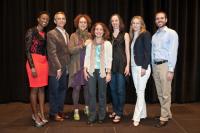 Elida Schogt's dynamic trilogy of films—Silent Song, The Walnut Tree, and Zyklon Portrait—explores the Holocaust through an abstract lens, offering an innovative artistic response to mass atrocities. Telling the story of her mother’s survival and her truncated family tree, the films are a collage of family photos, home movies and footage that confronts the audience with the complexities of the Holocaust. The films were screened and then followed by a discussion with Schogt and Michael Renov, documentary theorist and associate dean of the USC School of Cinematic Arts.
Elida Schogt's dynamic trilogy of films—Silent Song, The Walnut Tree, and Zyklon Portrait—explores the Holocaust through an abstract lens, offering an innovative artistic response to mass atrocities. Telling the story of her mother’s survival and her truncated family tree, the films are a collage of family photos, home movies and footage that confronts the audience with the complexities of the Holocaust. The films were screened and then followed by a discussion with Schogt and Michael Renov, documentary theorist and associate dean of the USC School of Cinematic Arts.
Artistic Responses to Mass Violence
USC Ground Zero Storytelling and Performance Art
April 9, 2013
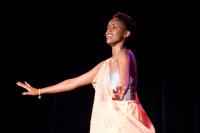
How do artists interact with firsthand accounts of mass atrocities? Does performance and storytelling have the power to transform perception, create a broader awareness and understanding about genocide, and bring about real change? Playwright Catherine Filloux presented her short play about the Cambodian genocide, Photographs from S-21. Activist-performer Yvette Rugasaguhunga performed her solo play, A Survivor's State of Mind. Following the performance, Rugasaguhunga -- who survived the Rwandan genocide as a child -- Filloux, USC dramatic arts professor Stacie Chaiken, and USC Shoah Foundation executive director Stephen D. Smith engaged with the audience.
Denouncing Violence Against Women
USC Fisher Musem Event
April 8, 2013

Denouncing Violence Against Women reveals the power of art and creativity to confront social injustices. This exhibition was presented as part of USC's Genocide Awareness Week, and the posters on display at the USC Fisher Museum of Art explored the artistic response to international genocides in Armenia, Congo, Guatemala and Rwanda, as well as the Holocaust and the murders of women in Ciudad Juarez in Mexico. It also presents visual cries against domestic violence, torture and trafficking. The exhibition showcased political posters, divided into four sections denoting different forms of violence towards women: Dehumanization, Individuality, Trauma and Breaking Bonds. Denouncing Violence Against Women revealed the power of art and creativity to confront social injustices.
______________________________________________________________________________________________________________
Yom HaShoah Commemoration
April 7, 2013
USC Shoah Foundation – The Institute for Visual History and Education remembered the victims of the Holocaust at a unique observance at Mount Sinai Memorial Park in Simi Valley, California. The day began with the official launch of the Six Million Coins™ fundraising initiative, which Mount Sinai Memorial Parks and Mortuaries has started to provide for Holocaust survivors and rescuers in need of basic necessities. The Jewish Federation of Greater Los Angeles and TRIBE Media Corporation have partnered with Mount Sinai to collect the coins; to inspire public support for the initiative, the Institute has provided video testimony from its Visual History Archive in which Holocaust survivors share their thoughts about giving to others. Stephen D. Smith, the Institute’s Executive Director, joined a panel of speakers that included Carl Wilkens, Director of World Outside My Shoes; Andrew Stevens, a Wallenberg survivor/rescuer; and Lizzie Scheja, Director of the Association for Jewish Culture in Sweden. Rabbi Ed Feinstein of Valley Beth Shalom and Cantor Marcus Feldman of Sinai Temple led a Yom Hashoah commemorative service, with a special orchestral performance of Transformation of Memory by the USC Thornton School of Music under the direction of Nick Strimple.
______________________________________________________________________________________________________________
2013 Student Voices Short Film Contest
3rd Annual Student Voices Awards Ceremony
March 28, 2013
The Student Voices short film contest enables USC students to join the conversation about genocide and human rights by using the Visual History Archive to craft visual arguments around these topics. The top films were screened at a special event hosted by the USC School of Cinematic Arts. Following the screening, Stephen D. Smith, Executive Director of the USC Shoah Foundation, moderated a discussion with the judges, including Ari Sandel, who won the 2006 Academy Award for Best Short Film for West Bank Story.
______________________________________________________________________________________________________________
“Re-membering” the Khmer Rouge: Exploring Cambodian American memory work
Lecture with Dr. Cathy J. Schlund-Vial
March 7, 2013
USC Shoah Foundation – The Institute for Visual History and Education co-sponsored a lecture by Dr. Cathy J. Schlund-Vials on the memory work of Cambodian Americans whose films, memoirs, and music represent a largely unexamined site of critique on Cambodian memory in the aftermath of genocide.
______________________________________________________________________________________________________________
Interrogating the Index: or, Reading the Archive Against the Grain
Lecture with 2012-2013 Institute Fellow Jeffrey Shandler
March 4, 2013
Accessing the extensive holdings of the USC Shoah Foundation's Visual History Archive depends on its elaborate system of cataloging and indexing. These finding aids reflect the original vision of the Visual History Archive (VHA) as a memorial project and as a resource for scholars and others interested in learning about the Holocaust from the perspective of survivors and other eyewitnesses. However, given the scope of the archive, the VHA’s interviews provide a wealth of information on many other topics as well. Institute Fellow Jeffrey Shandler's talk examined what can be revealed by reading the VHA “against the grain,” using its finding aids to consider: how survivors tell their stories; how the incorporation of live performance or of other media shape their narratives; the role played by language choice in shaping the interview process; how renowned survivors discuss their history of offering their personal narratives to the public figure in their life stories; and how humor figures in Holocaust remembrance, among other topics.
______________________________________________________________________________________________________________
Digital Media, Learning, and Empathy
Lecture with Howard Gardner and Mary Helen Immordino-Yand
February 11, 2013
World-renowned intellectual Howard Gardner joined USC’s Mary Helen Immordino-Yang to engage in conversation around literacy, learning and emotions in the digital age. In his recent work, Dr. Gardner has shared ideas about the shifting role of literacies in the digital age. In particular, Dr. Gardner’s recent work delineates different types of thinking and learning crucial to success in contemporary society, and also considers the ways in which digital media inform, disrupt, and interrupt these. Dr. Immordino-Yang’s recent work has focused on the science of empathy, based on her research using testimonies from the USC Shoah Foundation’s Visual History Archive. The collision of their work can address the philosophy, sociology, and science of teaching and learning in a post-postmodern, wired world.
______________________________________________________________________________________________________________
An Evening with Eva Schloss
January 22, 2013
Eva Schloss is a Holocaust survivor and stepsister to Anne Frank. Like her step-sister, Eva went into hiding in Holland, and was betrayed, captured, and sent to the Auschwitz-Birkenau death camp. The attendees listened to a first-hand account of the discovery and printing of Anne Frank’s famed diary and glean insight into the life and times of Eva Schloss and Anne Frank.
______________________________________________________________________________________________________________
Presenting the AMALACH Project
Lecture with Jan Hajic
November 30, 2012
AMALACH works on developing advanced continuous speech recognition, speech retrieval and machine translation methods to allow for a precise word -- and phonetic-based cross-lingual search in the Czech and English testimonies of the VHA archive -- with accuracy akin to that of a search in a text document.
______________________________________________________________________________________________________________
There your Memory Runs Like a Camera Back
Lecture with 2012-2013 Institute Fellow Sean Field
November 15, 2012
Dr. Sean Field discussed oral histories in the context of both the Truth and Reconciliation Commission and the Centre for Popular Memory in South Africa and approaches to studying memories of violence.
______________________________________________________________________________________________________________
Sexual Violence Against Women in the Holocaust
International Symposium held in collaboration with Remember the Women Institute and Equality Now; Keynote Speaker, Jane Fonda
November 7-8, 2012
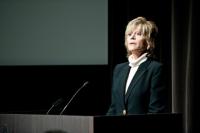
An historic international symposium on sexual violence during the Holocaust took place on November 7–8, 2012, convened by USC Shoah Foundation – The Institute for Visual History and Education, as well as the Remember the Women Institute. The approximately 20 academics and activists who participated have all worked on this issue, which has been overlooked by most historians for nearly 70 years. A highlight of the two-day symposium was a public event with Oscar-winning actress Jane Fonda on November 8, also co-sponsored by Equality Now. Ms. Fonda read excerpts from And the Rat Laughed, a novel by acclaimed Israeli writer Nava Semel, herself a child of Holocaust survivors. Published in English in 2008, the novel tells the story of a five-year-old Jewish girl who was sexually abused by the son of Polish farmers who hid her from the Nazis. Ms. Fonda also introduced a clip reel from a survivor’s testimony about rape; the testimony was provided by the USC Shoah Foundation, and the clip reel was produced for the occasion by the Foundation and Remember the Women Institute. Following Ms. Fonda’s remarks, Equality Now President Jessica Neuwirth moderated a panel discussion with Remember the Women Institute Executive Director and Sexual Violence against Jewish Women in the Holocaust co-editor Rochelle G. Saidel, and USC Shoah Foundation Executive Director Stephen D. Smith.
______________________________________________________________________________________________________________
Beyond Numbers
Panel Discussion
October 29, 2012
The panel discussed the recently published Encyclopedia of Camps and Ghettos, Volume II: Ghettos in German-Occupied Eastern Europe (Martin Dean, ed.) and The Diary of Samuel Golfard and the Holocaust in Galicia (Wendy Lower, author), both projects of the Center for Advanced Holocaust Studies at the United States Holocaust Studies at the United States Holocaust Memorial Museum. The panelists also addressed the role of the testimonies of the USC Shoah Foundation Institute in historical research.
______________________________________________________________________________________________________________
Video on the Syllabus
Panel Discussion
September 28, 2012
The event displayed how USC faculty are leveraging video to strengthen their students’ understanding of complex subject matter, and their students’ ability to express structured thoughts through multimedia. Professor Yaffa Weisman, who is director of the Francis Henry Library at Hebrew Union College and an associate professor of Jewish Studies, described her experiences using video in the context of her teaching, including the Shoah archives. DJ Johnson of the School of Cinematic Arts and the Institute for Multimedia Literacy (IML) discussed his use of audio-visual archives in teaching, how his students create visual arguments instead of term papers, and his insights into grading audio-visual assignments. Dan Leshem, associate director of the USC Shoah Foundation, moderated the discussion and provided an overview of the Shoah Foundation’s Visual History Archive tools, resources, and upcoming related workshops and events.
______________________________________________________________________________________________________________
Social Rehabilitation in Post-Genocide Cambodia
Lecture with 2011-2012 Research Fellow Kosal Path
September 27, 2012
Cambodian genocide survivor Kosal Path, a lecturer in the USC School of International Relations and a USC Shoah Foundation Fellow, discussed his research on social rehabilitation in post-genocide Cambodia.
______________________________________________________________________________________________________________
Mind Over Media
Panel Discussion
September 21, 2012
USC's Jesse M. Unruh Institute of Politics hosted a discussion on propaganda in the 21st century. We were joined by Stephen Smith, Executive Director of the USC Shoah Foundation, The Institute for Visual History and Education; Michael Sarid, Western Regional Director of the United States Holocaust Memorial Museum; Eli Attie, The West Wing screenwriter, TV producer, and former speechwriter; Dr. Steven Luckert, Curator of the United States Holocaust Memorial Museum's Permanent Exhibition and of State of Deception: The Power of Nazi Propaganda; Dr. Nancy Snow, Professor at the USC Annenberg School for Communications and Journalism and at Cal State Fullerton; Tom Waldman, Director of Communications and Media Relations for LAUSD; Bruce Zuckerman, USC Myron and Marian Casden Director and Professor of Religion. The discussion was co-moderated by Dan Schnur, Director of the USC Jesse M. Unruh Institute of Politics and Daniel Rothberg.
______________________________________________________________________________________________________________
Arts and Reconstruction after Genocide
Panel Discussion
September 20, 2012
In conjunction with the performance of Africa’s Hope, which explores the stories of Rwandan genocide survivors, members of the Rwandan theatre company Mashirika participated in a panel discussion on arts and reconstruction after genocide. The discussion was co-hosted by the USC School of Dramatic Arts / Applied Theatre Arts program and the USC Shoah Foundation. Rwanda has benefited from a long-standing relationship with the Shoah Foundation Institute, which has provided a framework for understanding the genocide and seeking pathways to healing and reconciliation.
Established in 1997, Mashirika is composed of artists from a variety of disparate cultures who were exiled in Uganda during the 1994 genocide. This core group of actors, dancers and musicians is dedicated to presenting workshops and plays exploring issues around collective trauma, conflict resolution, HIV/AIDS education, genocide healing and reconciliation.
______________________________________________________________________________________________________________
2011/2012 Academic Year
Yom HaShoah Commemoration Keynote Address
Lecture with Father Desbois
April 19, 2012
The grandson of a French prisoner held in the Rawa Ruska camp on the Poland-Ukraine border during World War II, Father Desbois began in 2004 to research the story of the Jewish, Roma, and other victims murdered in Eastern Europe during the war by the Nazi mobile killing units, the Einsatzgruppen. He has devoted his life to researching the Holocaust, fighting antisemitism, and furthering relations between Catholics and Jews.
______________________________________________________________________________________________________________
Yom HaShoah Scholar-in-Residence Inagural Lecture
Lecture with 2012 Yom HaShoah Scholar-in-Residence Yehuda Bauer
April 16, 2013
Yehuda Bauer discussed the topics of genocide and the Holocaust. In an exclusive trip from Jerusalem to Los Angeles, Yehuda Bauer brought more than five decades of experience as a pre-eminent international advisor and scholar on the Holocaust to USC for this special engagement.
______________________________________________________________________________________________________________
An Evening with Richard Berengarten: The Blue Butterfly and Other Poems
Poetry Reading
April 13, 2012
British poet Richard Berengarten (previously known as Richard Burns) read from his book, The Blue Butterfly, which responds to a massacre that occurred in 1941 near the town of Kragujevac, Serbia. Born into a family of musicians in 1943 London, Berengarten studied English at Cambridge (1961-1964) and Linguistics at University College London (1977-78). In 1975, he founded the international Cambridge Poetry Festival, which ran until 1985. He has lived in Italy, Greece, Serbia, Croatia and the USA, and has worked extensively in the Czech Republic, Latvia, Poland and Russia. His poetry integrates English, European, Slavic, Jewish, Mediterranean, Chinese, Japanese and American traditions.
______________________________________________________________________________________________________________
2012 Student Voices Short Film Contest
2nd Annual Student Voices Awards Ceremony
April 5, 2012
Fifteen short films were submitted for the 2012 contest and they developed around the following themes: Whose Responsibility is "Never Again”, Inheriting Genocide, and The Outsider in Me. The jury included Branko Lustig, Academy Award-winning producer and Holocaust survivor; Michael Renov, Professor of Critical Studies and Vice Dean of Academic Affairs, USC School of Cinematic Arts; and Holly Willis, Research Assistant Professor and Director of Academic Programs, Institute for Media Literacy, USC School of Cinematic Arts. Freshman filmmakers Kayla Carlisle and Will Merrick submitted the winning film, Strange Inheritance. The evening, which included the award ceremony, screening, and panel discussion, was co-sponsored by the USC School of Cinematic Arts, the USC Institute for Multimedia Literacy, the USC Casden Institute for the Study of the Jewish Role in American Life, USG Discretionary Funding Board, USC Levan Institute for Humanities and Ethics, the SFI Student Association, and the USC Undergraduate Student Government.
______________________________________________________________________________________________________________
Witness and Responsibility
Artistic Responses to Genocide
February 7, 2012
“Witness and Responsibility” was a day-long event focused on artistic work that engages with catastrophe and events--personal and world-wide--which challenge our sense of how things ought to be. How can artists use and/or respond to videotaped testimonies and other artifacts of “what happened” in the creation of something new and immediate and now? Can theatre serve in shaping an audience’s perception and ultimately the world?
______________________________________________________________________________________________________________
Open Protest and Other Forms of Jewish Defiance
Lecture with 2011-2012 Institute Fellow Wolf Gruner
January 18, 2012
Resistance during the Holocaust is still seen mostly in terms of organized or armed group activities, yet this perspective overlooks individual acts of opposition. Up to now, the availability of sources for analyzing the behaviour of German Jews has been limited. Historians used reports originated by the Nazi state and/or written post-war testimonies. In those sources, individual acts of opposition barely emerge. However, a closer analysis of the micro level of Nazi society challenges the common image of German Jews as passive victims. With hitherto unused local archival sources -- such as police precinct logbooks, trial material, and video testimonies -- one can demonstrate that many Jews performed acts of defiance and even protested in public, starting in 1933 and lasting well into the war.
______________________________________________________________________________________________________________
David Boder's Early Holocaust Testimony Project
Lecture with Alan Rosen
November 10, 2011
Alan Rosen spoke about David Boder's early Holocaust testimony project. In July 1946, Boder set sail for Europe, determined to record audio testimonies from Holocaust survivors in Displaced Persons camps. In Rosen's words, "His [Boder's] goals were straightforward. First of all, he wanted to preserve an authentic record of wartime suffering. Second, he was professionally interested as a psychologist in the impact of extreme suffering on personality. Third, he wanted to increase the knowledge of a post-war American public who knew little about what happened to the victims in the ghettos and in the concentration camps. And finally, he hoped that the DPs' stories could be effective in advocating on their behalf for immigration to America."
______________________________________________________________________________________________________________
2010/2011 Academic Year
Iseta: Behind the Roadblock
Film Screening
April 12, 2011
Screening of documentary ISETA: Behind the Roadblock, featuring the film’s co-director and producer, Eric Kabera. In April 1994, the first days of the Rwandan Genocide, a group of neighbors lived on a quiet road in Kigali. But when a Hutu roadblock was constructed there, all their lives were suddenly, violently disrupted.
______________________________________________________________________________________________________________
2011 Student Voices Short Film Contest
1st Student Voices Awards Ceremony
April 7, 2011
The USC Shoah Foundation Institute honored students from across the University who made short films using footage from the Institute’s archive of nearly 52,000 videotaped testimonies of Holocaust survivors and other witnesses. The awards ceremony, screening, and panel discussion, made possible by Visions and Voices and HBO, were the culmination of the Student Voices short film competition which invited all USC students to use the Institute’s archive in order to shape the conversation about violence and genocide. Among the competition jury and on the panel was Academy Award-winning producer Branko Lustig (Schindler’s List, Gladiator).
______________________________________________________________________________________________________________
Making Sense of Auschwitz: Realities & Representations
Lecture with Jonathan Webber
February 22, 2011
Jonathan Webber is an acclaimed social anthropologist specializing in Jewish life and culture, with much of his expertise derived from extended periods doing research in Poland. His lectures are based on his recent book, Rediscovering Traces of Memory: The Jewish Heritage of Polish Galicia (Indiana University Press, 2009).
______________________________________________________________________________________________________________
Lecture with Carl Wilkens
February 1, 2011
Carl Wilkens, founder of World Outside My Shoes and former head of the Adventist Development and Relief Agency in Rwanda, was the only American who remained in the country when the 1994 genocide began. His choice to stay and help, prevented the massacre of hundreds of children over the course of the genocide. Wilkens’ lecture discussed these experiences in detail.
______________________________________________________________________________________________________________
Enemies of the People
Film Screening
October 19, 2010
The USC Shoah Foundation Institute, in partnership with the Levan Institute for Humanities and Ethics, had a screening of the Enemies of the People, followed by a Q&A with director Rob Lemkin and Kosal Path, USC Lecturer and Cambodian genocide survivor. One of the most harrowing and compelling personal documentaries of our time, Enemies of the People exposes for the first time the truth about the Killing Fields and the Khmer Rouge who were behind Cambodia's horrific genocide. More than simply an inquiry into Cambodia's experience, however, Enemies of the People is a profound meditation on the nature of good and evil, shedding light on the capacity of some people to do terrible things and for others to forgive them.
______________________________________________________________________________________________________________
Rwanda, Confronting a Painful Past
Panel Discussion
September 10, 2010
“Rwanda, Confronting a Painful Past” was a panel discussion hosted by the USC Shoah Foundation Institute that addressed the role of testimony in the processes of national mourning, transnational justice, and memorialization. Participants in the panel discussion included: Beth Meyerowitz, USC Professor of Psychology; Mathilde Mukantabana, Professor of History at Cosumnes River College and President of Friends of Rwanda Association; Freddy Mutanguha, Director of the Kigali Memorial Centre and Secretary General of IBUKA; and James Smith, CEO of Aegis Trust. Lyn Boyd-Judson, Director of the USC Levan Institute for Humanities and Ethics, moderated the discussion.
______________________________________________________________________________________________________________
A Film Unfinished
Film Screening
August 2, 2010
A Film Unfinished, produced with the assistance of The Steven Spielberg Film & Video Archive, Yad Vashem Film Project and the Jewish Historical Institute in Warsaw, is the story of a movie that was never completed. At the end of WWII, 60 minutes of raw film was discovered, having sat undisturbed in an East German archive. Recorded in Warsaw by the Nazis in May 1942, and labeled simply "Ghetto,” this footage quickly became a resource for historians seeking an authentic record of the Warsaw Ghetto. However, the later discovery of a missing reel, which revealed that some scenes were staged and that several shots required multiple takes, complicated earlier readings of the footage. A Film Unfinished presents the raw footage in its entirety for the first time, carefully noting fictionalized sequences (including a staged dinner party) that falsely depicted "the good life" enjoyed by Jewish urbanites, and probing deep into the making of a now-infamous Nazi propaganda film. A Film Unfinished, directed by Yael Hersonski, is a film of enormous import, documenting some of the worst horrors of our time and exposing the efforts of its perpetrators to propel their agenda and cast it in a favorable light.
Please continue to return for updates